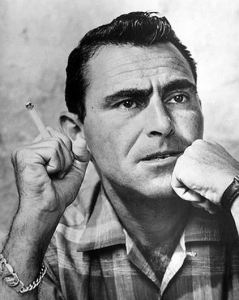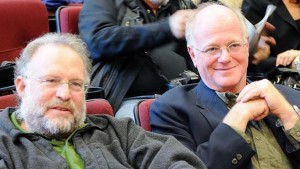The Twilight Zone
Rodman Edward Serling (1924-1975) was born in Syracuse, New York. From a very young age he was drawn to performing, spending hours each day acting in his basement. Initially a class clown, and thought to be a “lost cause” by his teachers, Serling was soon a key member of his high school debate team, a public speaker, journalist, athlete, and social activist. The day after graduating high school, he enlisted in the army and fought in World War II as a paratrooper, earning a Purple Heart and a Bronze Star, among other medals. After the war, he studied physical education, then switched to theatre, broadcasting, and literature. It was in his college days that he began writing, directing, and acting in radio programs. He struggled to break through in the radio industry for several years after, meanwhile earning money on the side by participating in dangerous flight experiments for the Air Force (and nearly getting himself killed on multiple occasions). He then tried his luck at television, and after many years of writing scripts, Serling finally got a break. His 72nd script, Patterns, earned many accolades and was described by some at the time as the best program in the short history of television. After this success, he had little worry finding jobs. However, corporate sponsors and politicians always meddled with his scripts. Fed up with this, Serling created his own show: The Twilight Zone. The series became an instant hit, and in 2013 was ranked as the third best TV show of all time. Serling went on to write and produce a number of other television, film, and radio programs. He also wrote many short stories and poems, and published 11 books. On top of this, Serling taught film and media at colleges across the US. Throughout his life, his primary goal was to spread awareness of human equality, world peace, and social justice. This was the underlying theme of all of his work, and Serling himself often stated that “the ultimate obscenity is not caring.” Sadly, Serling died at the young age of 50 from a string of heart attacks. He is credited with helping to establish television as a serious medium, and his episode of Patterns was the first TV rerun in history. He was ranked first among the “25 Greatest Sci-Fi Legends” by TV Guide. Serling won 8 Emmys, 3 Hugo Awards, and a Golden Globe, among others, and has been inducted into both the Television Hall of Fame and the Science Fiction Hall of Fame.
Words of the Week
As long as they talk about you, you’re not really dead, as long as they speak your name, you continue. A legend doesn’t die, just because the man dies.
– From an episode of The Twilight Zone (written by George Clayton Johnson)



